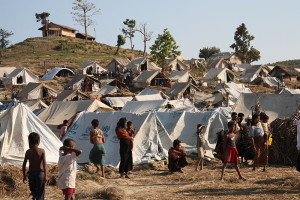
Less than one hundred days after Burma’s democratically elected government took office, the US State Department declared that it would put the country on its list of worst human trafficking offenders. The State Department’s annual Trafficking in Persons (TIP) report downgraded Burma to the lowest tier, Tier 3, where it joins the rank of countries such as Syria, Iran, and North Korea. Rationalizing the demotion, the report explains that “the Government of Burma does not fully meet the minimum standards for the elimination of trafficking and did not demonstrate overall increasing efforts compared to the previous reporting period.”
Many view this ranking as a US criticism of the Burmese government’s treatment of the Rohingya, a Muslim minority population within the country. The military junta that formerly held complete control over Burma firmly asserts that the Rohingya are external immigrants, referring to them as “Bengalis” because of the belief that the Rohingya originated from Bangladesh. Through government policies, such as revoking the citizenship of the Rohingya and passing discriminatory race laws, the country has taken significant measures to isolate and expel the population. Additionally, Buddhist nationalism has led many in the general population to discriminate against the Rohingya, forcing entire families and communities into government-run camps where they are denied basic human rights.
The persecution of the Rohingya has driven many to flee from the country, and, in their desperation, fall into the hands of human traffickers. According to the International Organization for Migration, in the first three months of 2015, an estimated 25,000 Southeast Asian migrants—primarily Rohingya—piled into rickety boats and paid smugglers inordinate fees to bring them to neighboring countries such as Thailand and Malaysia. When the boats are not stranded at sea and rejected by neighboring countries, they become an easy target for human traffickers. Once captured and taken to countries like Thailand, the Rohingya are thrown in camps in the middle of the jungle where they are held until relatives pay thousands of dollars to release them. In 2015, a joint military-police task force discovered mass graves at these trafficking camps, holding the bodies of dozens of Rohingya. At the time of the discovery, Thailand was also a Tier 3 human trafficking offender, but it has since made the leap to the Tier 2 “watchlist” due to its increased prosecutions of traffickers in the seafood industry.
Today, the government of Burma is no longer completely controlled by the military. In November 2015, The National League for Democracy (NLD), led by Aung San Suu Kyi, won the majority of seats in Parliament. While the foreign citizenship of Suu Kyi’s children constitutionally bars her from serving as president, she still wields primary control over the government. Many hoped that Suu Kyi would reverse the discriminatory policies that marginalize the Rohingya, but instead, Suu Kyi has faced heavy criticism for her silence on the issue. Recently, she even asked the US not refer to the minority as ‘Rohingya’ due to the fact that they are not recognized in Burma.
While mass migration by boat has become less common over the last few months, local communities continue to harbor a deep-rooted hatred for the Rohingya and force the minority into camps. Thus, many still face forced labor and the exploitation of human traffickers. “The chronic, chronic abuse of the Rohingya has not been dealt with at all,” a U.S. congressional aide said when asked about the TIP report. Changes must be made in Suu Kyi’s approach to the Rohingya situation if Burma is to improve its standing in the international community next year.
–
 Casey Bush is a rising sophomore at Clark University, where she leads the Clark STAND chapter. She is a summer intern for STAND in Washington, DC, and is STAND’s incoming Campaigns Coordinator. Casey can be reached at cbush@standnow.org.
Casey Bush is a rising sophomore at Clark University, where she leads the Clark STAND chapter. She is a summer intern for STAND in Washington, DC, and is STAND’s incoming Campaigns Coordinator. Casey can be reached at cbush@standnow.org.

Pingback: Week Four – Casey in DC